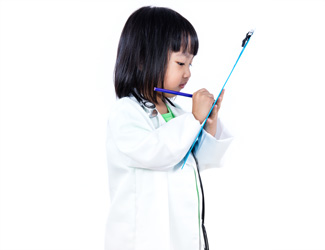Family Support
Our clinical social workers provide information on financial and other support services available to your child and family. Our child life specialists help children understand, at a developmentally appropriate level, what will happen during tests or procedures. Our goal is to lighten your load so that you can focus on your child’s care.
Language Services
We have interpreters onsite for Spanish, Arabic, French, and American Sign Language. We can arrange for interpreters to join appointments in person or by phone for other languages as well.
Transition to Adult Audiology Care
Our pediatric audiologists work closely with audiologists who specialize in treating adults, and we are committed to supporting you and your child as they transition to adult care.
Nationally Recognized Experts
We keep abreast of the latest treatments to enhance our practice and your child’s care. Our audiologists attend state, national, and worldwide conferences to stay current on best practices and share their expertise. Our specialists have undergone advanced training, and many have advanced certification in specialized areas. Our combined skill and leadership mean you work with some of the most knowledgeable and experienced audiologists in the country.


